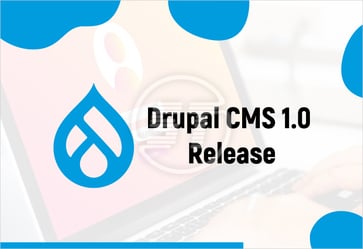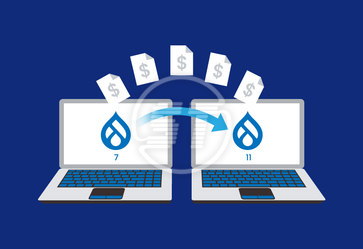Drupal CMS is one of the robust and secure platforms being used by various enterprises including Government organizations. The spectrum of modules lets the website administrators organize, customize, and manage content easily on Drupal. Despite all the measures taken, no website is fully immune to cyber-attacks as potential hackers constantly keep trying to break into your system by finding loopholes. In wake of rising security vulnerabilities, Drupal security has become paramount and one needs to follow a diligent process to enhance the Drupal website’s security.
Before we begin on what measures you can take to maintain the security of your Drupal website, let’s first look into the nature of security issues first.
Firstly, the number of security vulnerabilities reported in Drupal is less when compared to the other peer platforms like WordPress. But it is troubling to see that there are still issues that imperil the platform. XSS attacks, DDoS attacks, SQL injections, HTTPS response splitting, etc. are some of the security issues frequently found in Drupal. Out of all, XSS itself accounts for nearly 50% of them. There are still some unknown security vulnerabilities existing in Drupal and hence it is very important to follow certain practices to safeguard your Drupal website. That’s why you need to carefully hire Drupal developers for your project!
Drupal Security Best Practices and Measures
Stay Up-to-date
Update your Drupal versions. If you are still on Drupal 7 or Drupal 8, it is time to make an upgrade to Drupal 9, the latest version released in 2020. Also, update the modules that contain security patches against various security vulnerabilities. If you are still on the older versions, you are just exposing your Drupal site to numerous vulnerabilities. If you are unable to do it on your own, you may take help from any Drupal Development Company. Back in 2014 hackers made older versions of Drupal websites their soft targets, and fetched sensitive data. You need to install and use trusted Drupal modules and themes taken from reputed companies so that you do not put your Drupal security in a fix. Explore our Drupal migration services to know more.
Regular Drupal Backups
You need to take a regular backup of your Drupal website’s data since this is the easiest way to restore your website if there are security attacks. Backup all the website essentials and elementals that are critical for website functioning. You need to compulsorily backup the Drupal core as well as Drupal module files. These will help in quick recovery and also rollback in case of emergency. Pantheon is a managed Drupal host that offers one-click backup and restores. It also provides sandbox environments for testing before deploying. You can also rely on XAMPP software to locally test all your updates before making them live. The latest Drupal versions have some modules like ‘Backup and Migrate’ which takes care of the MySQL databases, code, files, and other directories.
Connect Securely
Always make a secure connection like SSH or SFTP encryption. Do not save the FTP passwords as these are not usually encoded and are available in plaintext which becomes easy for the hacker to misuse. Setup the firewalls on the home router and do not access your website on public networks which are not usually secure. For server-side security, you can deploy proper hosing security, update your PHP & MySQL versions, and build firewalls to properly isolate your accounts. Do not go for shared hosting as it has its own security risks and you may also have to face issues like shared IPs, or overcrowded servers.
Secure File Permissions
Files present on your website may have some critical information regarding the smooth functioning of your website. And hence these files must be protected from unauthorized access by setting up the appropriate permissions to keep the intruders at bay. Just make sure not to make them excessive as it can damage your Drupal installation and modules, and hamper your efficiency. You can also selectively block access to some sensitive files like authorize.php, cron.php, isntall.php, upgrade.php.
HTTP Security Headers & SSL encryption
You can secure your HTTP headers via a small change in the configuration on your web server. You can use content-security policy, X-XSS-Protection, Public-key-Pins, etc. as the HTTP security headers. You can also use an SSL certificate for enabling HTTPS for processing the data securely. Especially for the login pages, if you are not using an HTTPS connection, then the chances of interception are high. So, get an SSL certificate from a trusted source to secure your Drupal site.
Use Strong Passwords
With easy brute force attacks, cybercriminals are able to break into your system. So, make sure you use strong and complex passwords. Also, makes sure you have a unique username that is not easily predictable by hackers. This way you can improve your Drupal security. You can also encrypt these so that it is difficult for a brute-force attack. You can change the username and password on the Drupal dashboard. Alternatively, you may also rely on some digital password generators for creating strong and secure passwords at zero cost.
Block Malicious Bot Traffic
As you widen the reach of your Drupal website, it is indirectly exposing itself to bad bots, crawlers, scrapers, etc. that are ready to steal your bandwidth. Drupal has many security modules that can block these malicious bot traffic. Sometimes you may also have to configure these modules at the server level as well. You can make changes to the .htaccess file to block these obtrusive agents.
Drupal Security Modules
There are also a number of Drupal Security modules that harden the security of the website from malicious attacks by thwarting them successfully and monitoring the website continuously. Some of them are
- Login Security Module - This module retrains the number of login attempts and blocks specific IP addresses temporarily or permanently. Any brute-force attacks can be avoided using this module.
- Password Security Module - You can configure this module for setting up strong passwords as well as set password validity.
- Drupal Security Review Module - For conducting a security audit of your website. It also provides suggestions if your website needs security changes.
- CAPTCHA Module - It is required if you want to differentiate an automated login attempt by bots from human login attempts.
- Duo Two-factor Authentication Module - This enables multi-factor authentication for adding extra layers of security to the website
- Update Manager Module - This module informs about the latest updates in Drupal and helps you not to skip a single update.
- Paranoia Module - This module evaluates to block any PHP SQLi vulnerabilities.
- File Integrity Check Module - Checks the current Drupal installation, contributing modules, themes, etc., and sees if there are any changes that are made. These would be reported on an emergency basis.
Summary
Security of your Drupal website is crucial and measures should be taken to not letting your website prone to any such attacks. There are a number of ways you can secure your Drupal website and if required, you can also go for a security audit. A security expert would check the patterns and inform you of the measures to be taken to protect your website.
Skynet Technologies is providing end to end custom Drupal development and design services. Our Drupal developers have great experience in developing secure, modular & feature-rich Drupal CMS websites. We make your Drupal applications secure by encrypting the database, oversee the design to meet encryption laws, and security models like PCI for the payment gateway, HIPAA. We provide Drupal maintenance and support services by performing regular site audits, security updates, upgrades, optimizations, and other support services. We strive to keep our clients’ Drupal websites up-to-date and secure. We fix any security issues immediately to avoid trouble. Get in touch with us to know more!


